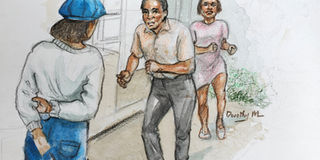Misdeeds of a prosecutor

What you need to know:
- In the course of her work, there was a tradition called the Hammer award, a commendation with a picture of a hammer, and this was awarded to prosecutors who won big convictions or long sentences.
In 2005, Ms Amy Weirich was a 40-year-old rising star in the Memphis prosecutor’s office in Tennessee, US.
In the course of her work, there was a tradition called the Hammer award, a commendation with a picture of a hammer, and this was awarded to prosecutors who won big convictions or long sentences.
The reward structure fostered a win-at-all-costs mindset, fuelled by the belief that everyone is guilty all the time. The measure of a prosecutor’s worth came down to the number of cases one tried and the outcomes.
Prosecuting Noura
Ms Weirich was responsible for the prosecution and conviction of Noura Jackson for the murder of her mother, Jennifer Jackson in 2005. In 2008 Noura was sentenced to a prison term of 20 years and nine months which the prosecution considered was a great verdict.
However, on August 22, 2014, the Tennessee Supreme Court unanimously overturned Noura’s conviction and one of the reasons for this was that the prosecution had withheld vital evidence from Noura’s lawyer.
Ms Weirich appears to have been an ardent and diligent student of one of her mentors, Tom Henderson, a long-time Shelby County prosecutor who had won major trials and helped her rise through the ranks.
Background
In two death-penalty cases in the 2000s, courts found that Henderson did not give the defense all the evidence he should have. In one case the result was a mistrial, and the accused person was later acquitted.
In the other case the judge found that the nondisclosures were unintentional and did not affect the verdict. In yet another case, prosecuted by Henderson, a murder conviction was reversed in 2012.
In this particular case court found that Henderson had purposefully misled the defense about an eyewitness who identified an alternative suspect in a photo spread. Henderson was subsequently censured although Ms. Weirich dismissed his lapses as human error.
Weirich through the lens
To other lawyers the prosecutor did not believe that ethical violations were important or serious.
After Noura’s conviction was overturned in 2014, other questions arose about Ms Weirick’s past practices at trial. Later that year a judge ordered her to testify about a murder case she had handled in 2005 in which a man was convicted of killing his wife. On appeal, a defense attorney and a prosecutor who was new to the case found a manila envelope in the files.
It was labelled with a sticky note, which the lawyers said read something along the lines “do not turn over to defence” and was signed with Ms Weirich’s initials.
Defence
When they later returned to the files to look inside the envelope, it was gone and Ms Weirich denied knowing anything about the envelope.
Ms Weirich was again compelled to testify privately in a challenge of a murder conviction in a capital-challenge case in which an important letter was not given to the defence at trial. In the letter, a gang member confessed that the accused person had been framed.
In yet another case, the Court of Appeal overturned a murder conviction on the grounds that one of the witnesses had been compromised. The court was of the opinion that any competent prosecutor should have carefully reviewed the case file and found this gross anomaly.
Conviction reversed
Noura’s conviction was reversed by the Tennessee Supreme Court and this was the only case in 50 years in which the Supreme had reversed a conviction on the grounds that the prosecution had withheld evidence from the defence. Ms Weirich however opted to retry the case.
During the initial trial the prosecution presented a great deal of testimony about a small cut on Noura’s left hand, covered with adhesive tape between her thumb and forefinger, on the morning her mother was killed.
Asked how she got cut, Noura gave differing explanations to friends and her aunts and half-uncle, and these different explanations were presented to the jury.
Previous testimonies
The police testified that in her initial statement in the early morning hours of the day her mother was killed, Noura did not mention a shop she made a stopover at from which the jury was shown a video footage of her buying bandages and skin-care products.
Noura replayed this episode over and over in her mind. During the initial trial Noura’s lawyer advised her not to testify and no witnesses were called to her defence.
She wanted to explain that she had not told the police about stopping at a store to buy bandages because she did not think it was important. She had cut her hand on a broken beer bottle while she was drinking with friends the Friday night before her mother was killed. In fact, her mother bought the first package of bandages, jotting down the item on the shopping list, which the jury did not get to see because the judge questioned its authenticity.
It is extremely rare for daughters to kill their mothers, and when the crime occurs, it often follows a history of child abuse.
Though Ms Weirich argued at trial that Noura clashed with her mother, by all accounts Jennifer Jackson was a loving mother and she and her daughter were close.
The police said Jennifer had fought back against her attacker, but Naura’s manicure was in perfect condition the next morning, according to pictures taken at the police station.
And if Noura cut her hand killing her mother, would not blood from her cut be found in the spattered bedroom?




